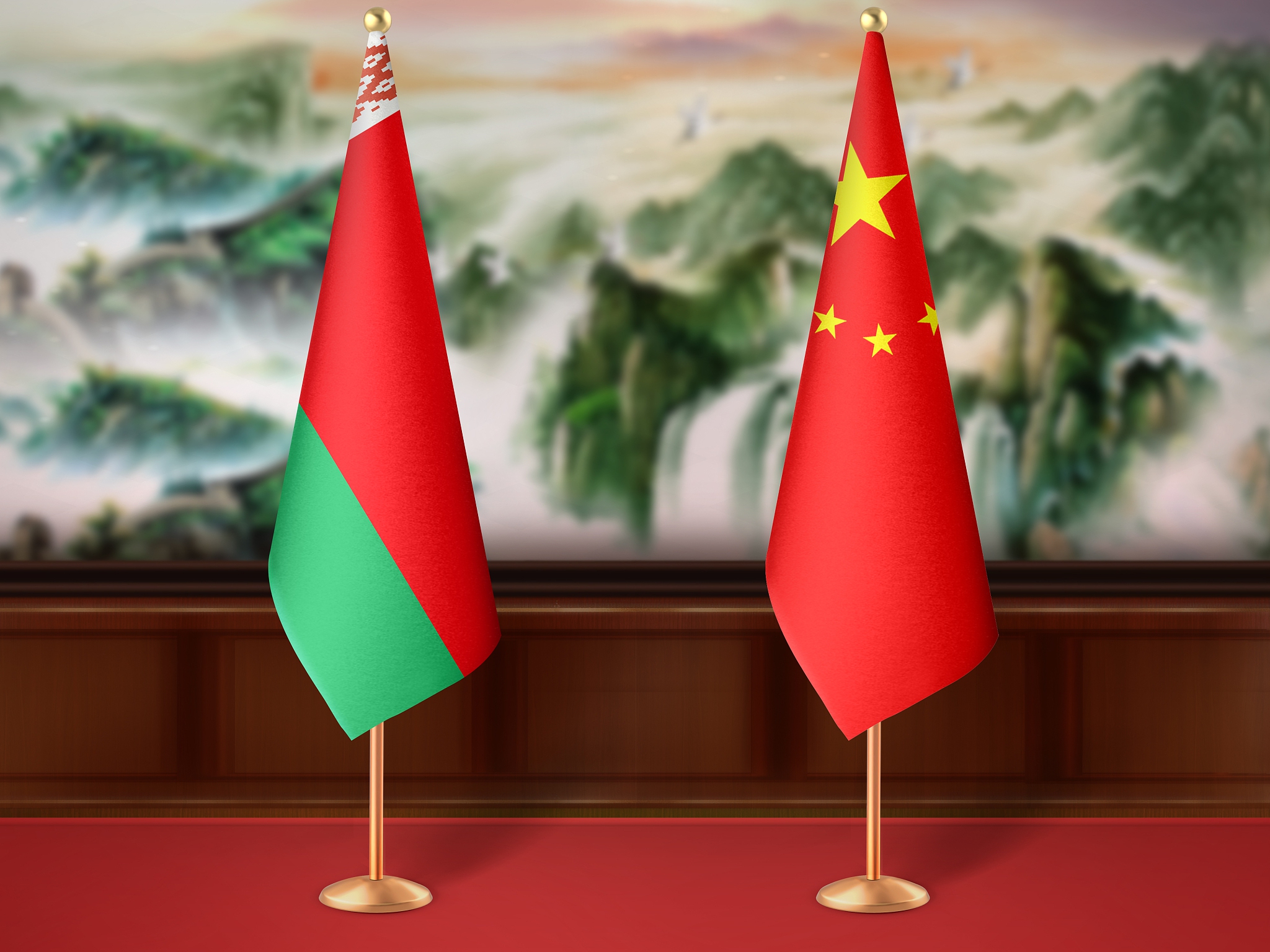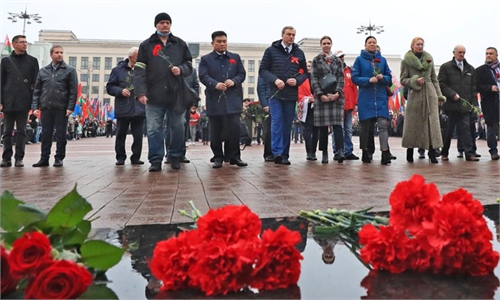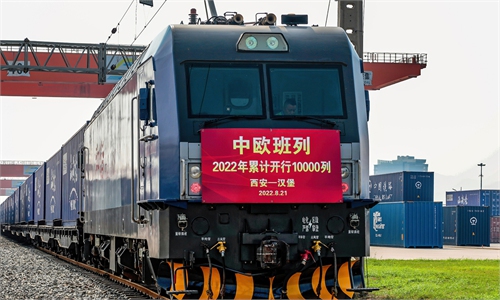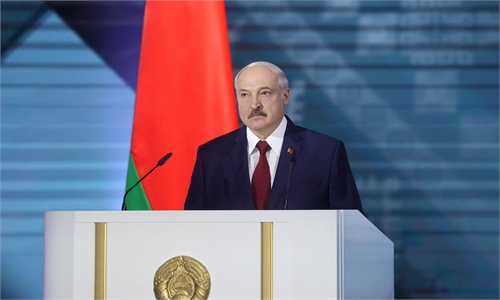Belarusian president kicks off China visit with trade ties, Ukraine crisis in focus

National flags of China, Belarus Photo:VCG
Belarusian President Alexander Lukashenko on Tuesday kicked off a three-day state visit to China and is expected to meet with Chinese President Xi Jinping in Beijing. His visit comes as China attempts to promote a political settlement of the Ukraine crisis through a position paper issued on the first anniversary of the Russia-Ukraine military conflict, and the US smears China of "supplying weapons" to Russia.
The 10th anniversary of the China-initiated Belt and Road Initiative (BRI) is also an important juncture that could easily be obscured by geopolitical conflict, as Belarus was among the first countries to support and participate in the initiative.
Chinese experts believe that economic and trade cooperation under the BRI, including boosting bilateral trade volume, will be a focus of the visit.
In an interview with Belarusian state media BelTA on Monday, Chinese Ambassador to Belarus Xie Xiaoyong disclosed that there will be an in-depth exchange of views on bilateral cooperation in various fields and on the international and regional agenda.
A number of cooperation documents will be signed in areas such as politics, economy, trade, finance, manufacturing, agriculture, science and technology, sports, tourism, healthcare, interregional cooperation and mass media, Xie said.
China and Belarus agreed to upgrade bilateral relations to an all-weather comprehensive strategic partnership in September 2022. BelTA said Lukashenko's visit will continue the long-standing policy to build relations of friendship and mutually beneficial cooperation.
Zhao Huirong, an Eastern European studies expert from the Chinese Academy of Social Sciences, told the Global Times on Tuesday that after the upgrading of ties, the two sides are seeking to enrich the meaning of the all-weather comprehensive strategic partnership, which means economic and trade cooperation could be a focus of the visit.
Belarus hopes that China will continue to increase investment, ensure the steady development of previous investment projects and production capacity cooperation projects in Belarus, and enhance bilateral trade volume, especially when Belarus is facing Western sanctions and containment, Zhao said.
With the growth of biliteral ties, China and Belarus has seen a boom in trade over the past years. Statistics from the General Administration of Customs of China show that two-way trade surpassed $5 billion in 2022, up by 33 percent year-on-year.
Cui Hongjian, director of the Department of European Studies at the China Institute of International Studies, told the Global Times that Belarus is a country where the BRI has yielded fruitful results, such as the Great Stone China-Belarus Industrial Park and other free economic zones.
Belarus is halfway between Russia and Europe and is on the China-Europe freight train route. In addition, Belarus has a strong machine manufacturing sector, which means there is a lot of room for cooperation in the future, Cui said.
And it is believed that the two countries will make progress in trade cooperation, production capacity cooperation, logistics, digital economy and other areas under the BRI, Cui noted.
"We are expecting more high-tech enterprises from China to join the industrial park," Lukashenko said in an interview with the Xinhua News Agency on Monday.
Like-minded partners
After China issued its 12-point position paper on the Ukraine crisis on Friday, which has been described as "a testimony to its peaceful foreign policy," Lukashenko told Xinhua that China has become a major country with an independent policy and "not a single issue in the world can be resolved without China."
Analysts said that Belarus' support for China's position on a political settlement to the Ukraine crisis paves the way for future cooperation in multilateral frameworks such as the Shanghai Cooperation Organization (SCO), of which Lukashenko said he expects Belarus will become a full member in 2023.
But as a neighbor of Russia and Ukraine, Belarus faces a tough geopolitical situation, and the risks to its security environment are increasing. If the conflict expands, Belarus could be dragged into it, experts said.
During his visit to China, Lukashenko is likely to exchange views with the Chinese side on the situation in Ukraine, Zhao said. "The two sides will discuss how to ease the conflict between the parties through negotiations."
Lukashenko's visit will make China better aware of Belarus' position on the Russia-Ukraine conflict. It will be very constructive for China to grasp the whole situation of the crisis and play a better role in promoting a political settlement, Cui Hongjian said.
If the international community, including China, can play a role in promoting peace talks, it will certainly be helpful to ease the security risks of Belarus, Cui said.
Some Western media outlets view Lukashenko's visit through a biased lens, describing Belarus as Russia's "little ally," and attempt to bind China with the two countries together to condemn them. Analysts said such narrow-mindedness reflects Western political elites' insincerity and hypocrisy toward peace, as Minsk has played the role of mediator between Russia and Ukraine on multiple occasions in history. At the same time, as one of the permanent members of the UN Security Council, China has always played a positive role in promoting peace talks.
China always opposes tying the Ukraine crisis to all bilateral relations. It is ridiculous to stipulate that China should not develop bilateral relations with Russia, Ukraine and Belarus because of the Ukraine crisis, Cui said.
China believes that the existing international trust, cooperation and stability should not be undermined because of the crisis. Compared with the US' narrow choice of taking sides and sanctions, China's vision is much broader and more responsible, Cui said.
From China's top diplomat Wang Yi's Europe and Russia visits to Lukashenko's Beijing trip, as well as possible visits to China by French President Emmanuel Macron and European Commission President Ursula von der Leyen, China will gradually find more like-minded partners to promote a political settlement to the Ukraine crisis, Cui said.
China and Belarus firmly support each other in safeguarding their core interests, and they also share a lot of consensus and common interests on the international stage, Zhao said. "The two sides are expected to work more closely under multilateral frameworks such as the UN and the SCO in the future to promote a more equitable international order," he said.




